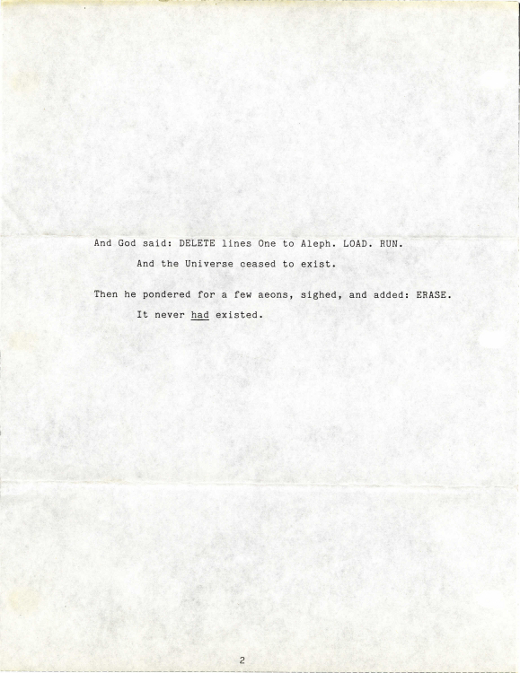As brevity in fiction goes, who can top “For sale: baby shoes, never worn”? That much-referenced six-word story, often attributed to Ernest Hemingway, certainly packs an impressive amount of human drama into its short length. But what about other genres? What would a six-word science- fiction story look like? i09 crowdsourced countless such works in 2014: responses, which tended toward the eschatological, included “The Universe died. He did not,” “New world. Cryogenic failure. Seeds dead,” and “Finally sentient, it switched itself off.”
Not bad, but what would we get if we went to the professionals? Alas, Sir Arthur C. Clarke, prolific author of such respected sci-fi novels as 2001: A Space Odyssey and Rendezvous with Rama, passed away just five years before i09 issued its challenge. Still, we have an idea of the direction his entry might have gone in from of “siseneG,” a story story — a very short story indeed — Clarke sent in to Analog magazine in 1984:
And God said: DELETE lines One to Aleph. LOAD. RUN.
And the Universe ceased to exist.Then he pondered for a few aeons, sighed, and added: ERASE.
It never had existed.
“This is the only short story I’ve written in ten years or so,” Clarke wrote in the accompanying note. “I think you’ll agree that they don’t come much shorter.” We now know that they can come somewhat shorter, at least 25 words shorter than “siseneG,” but surely we can all agree that Clarke set a high standard for scientific (or perhaps technological-existential) flash fiction decades before the coinage of the term. But then, we always knew the man had a knack for looking ahead.
via Letters of Note
Related Content:
In 1964, Arthur C. Clarke Predicts the Internet, 3D Printers and Trained Monkey Servants
Arthur C. Clarke Predicts in 2001 What the World Will Look By December 31, 2100
Arthur C. Clarke Narrates Film on Mandelbrot’s Fractals; David Gilmour Provides the Soundtrack
Free Science Fiction Classics on the Web: Huxley, Orwell, Asimov, Gaiman & Beyond
Colin Marshall writes on cities, language, Asia, and men’s style. He’s at work on a book about Los Angeles, A Los Angeles Primer, and the video series The City in Cinema. Follow him on Twitter at @colinmarshall or on Facebook.



Doesn’t everyone know this one? I thought it was famous as the shortest SF story ever written but I can’t recall who wrote it:
“The last man on earth sat alone in a room. There was a knock at the door”.
Read Arthur